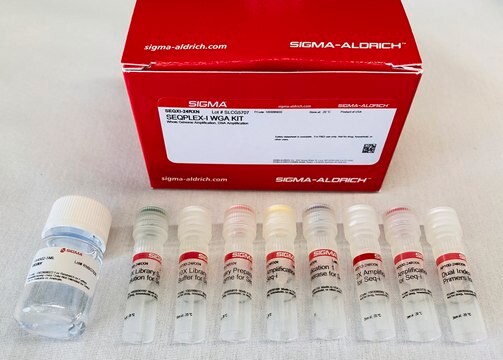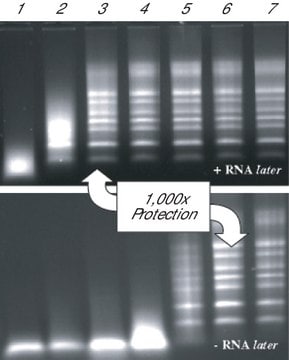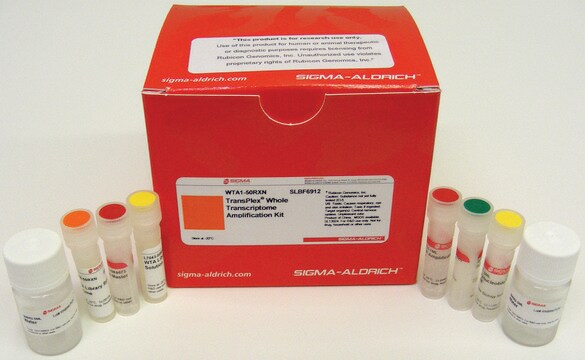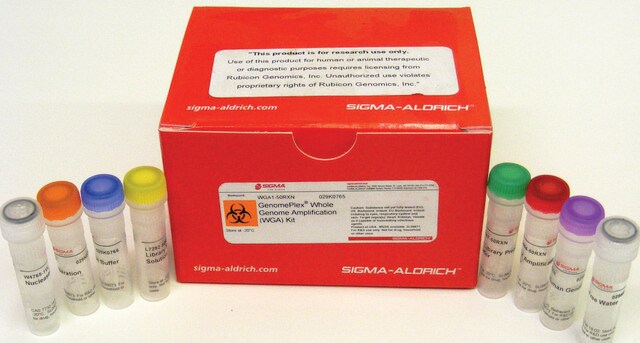SEQRI
SEQPLEX-I WTA Kit
Whole Transcriptome Amplification, RNA Amplification
Synonyme(s) :
RNA amplification kit
About This Item
Produits recommandés
Technique(s)
whole genome amplification: suitable
whole transcriptome amplification: suitable
Compatibilité
Illumina (Next Generationa Sequencing)
Conditions d'expédition
wet ice
Température de stockage
−20°C
Description générale
Pre-amplification/Library Synthesis: In the Pre-amplification/Library Synthesis step using the (Library Preparation Reagents), the template RNA is reverse transcribed using primers composed of a semi-degenerate 3′- and universal 5′-ends. As polymerization proceeds, displaced and RNaseH generated single strands serve as new templates for additional primer annealing and extension producing random, overlapping cDNAs flanked by a universal primer (5′) and primer complement (3′) sequence.
Amplification 1: In the Amplified Library Synthesis step (using the Amplification 1 Reagents), products from pre-amplification/library synthesis are amplified by single primer PCR via the proprietary universal end sequence. These amplification products typically range from 200 to 500+ base pairs. Note: Amplicons from degraded RNA, such as Formalin Fixed Paraffin Embedded (FFPE), are typically shorter and dependent upon the length of the starting RNA.
Amplification 2: In the Sequencing Library Synthesis step (using Amplification 2 Reagents), single primer amplicons from amplification 1 are converted to dual Illumina® primer PCR products ready for purification, quantification, and Illumina® NGS.
Application
Caractéristiques et avantages
- Amplifies fragmented/extremely small quantities of total RNA: Fragmented or intact RNA from all sources including FFPE and RIP are easily amplified by random priming technology.
- Semi-degenerate library primer design ensures more complete transcriptome coverage and efficient priming
- Fewer Steps: No need to fragment cDNA before sequencing
- High-efficiency: Amplifies ds-cDNA in 8 hours or less
- Cost-effective: No longer requires an additional NGS library prep step
- Compatible with Illumina® next generation sequencing
Autres remarques
a) The reagents in this kit have been tested to assure that RNases are absent.
b) The user, however, must protect the integrity of experimental results by wearing basic protective equipment, including gloved hands and lab coat.
c) All reagent transfers throughout this procedure should be performed in a laminar flow hood or dedicated clean room.
d) Frozen RNA samples should be thawed on ice.
2) A 20 μL Amplification 2 reaction will produce >100 ng of amplified double-stranded cDNA when starting with 100 pg to 5 ng of high-quality RNA. Higher input quantities and higher quality RNA template generally result in increased yields. For damaged RNA, such as from FFPE, 1–50 ng input RNA is recommended.
3) The dual index adapter primers (AP100) provided in this kit will only work for one sample. If pooling samples for sequencing is required, the user must provide additional index primer sets. See example index primer sequences on page 2 of the technical bulletin.
Informations légales
Clause de non-responsabilité
Produit(s) apparenté(s)
Mention d'avertissement
Danger
Mentions de danger
Conseils de prudence
Classification des risques
Resp. Sens. 1
Code de la classe de stockage
10 - Combustible liquids
Faites votre choix parmi les versions les plus récentes :
Certificats d'analyse (COA)
Vous ne trouvez pas la bonne version ?
Si vous avez besoin d'une version particulière, vous pouvez rechercher un certificat spécifique par le numéro de lot.
Déjà en possession de ce produit ?
Retrouvez la documentation relative aux produits que vous avez récemment achetés dans la Bibliothèque de documents.
Notre équipe de scientifiques dispose d'une expérience dans tous les secteurs de la recherche, notamment en sciences de la vie, science des matériaux, synthèse chimique, chromatographie, analyse et dans de nombreux autres domaines..
Contacter notre Service technique









